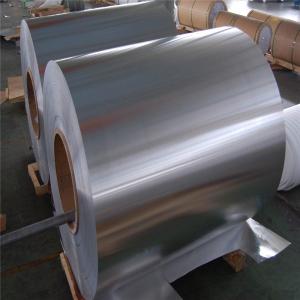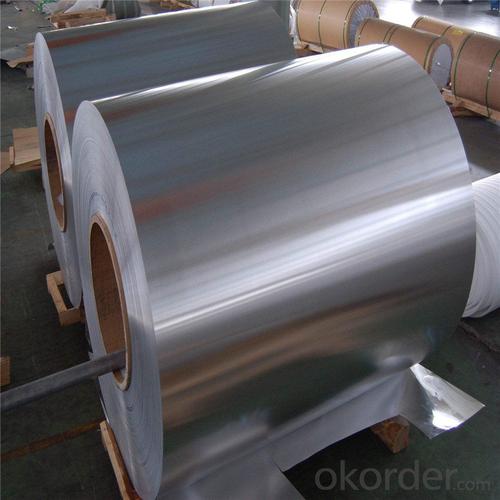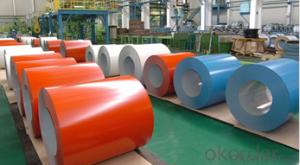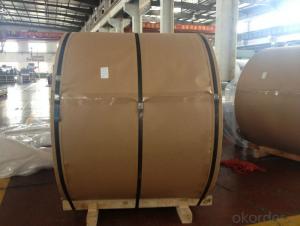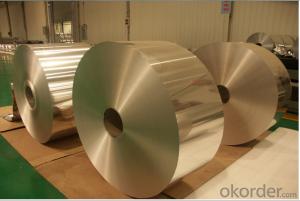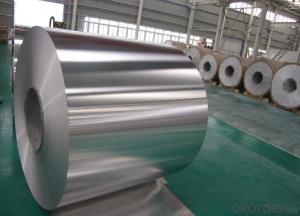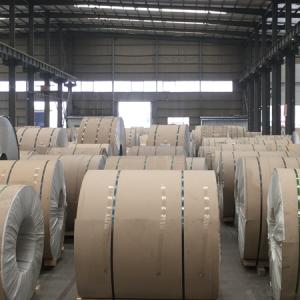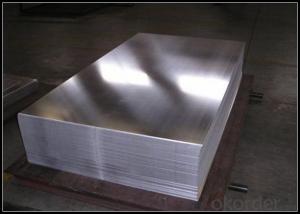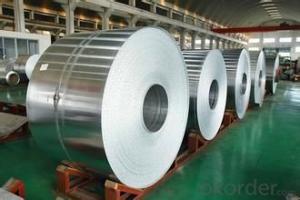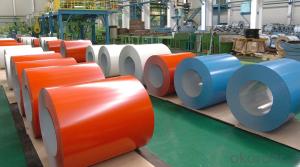5754 Coated Aluminum Coil - 1050/1100/1070 1060 Aluminum Coil with Good Price and Quality
- Loading Port:
- China main port
- Payment Terms:
- TT or LC
- Min Order Qty:
- 5 m.t.
- Supply Capability:
- 5000 m.t./month
OKorder Service Pledge
OKorder Financial Service
You Might Also Like
Aluminum Coil 1060/1050/1100/1070
Chemical Composition:
| COMPOSITION % Percent | |||||||||
Si | Fe | Cu | Mn | Mg | Zn | Ti | Other elements | Al | ||
Each | Total | |||||||||
1070 | 0.200 | 0.250 | 0.040 | 0.030 | 0.030 | 0.040 | 0.030 | 0.03 | — | 99.70 |
1060 | 0.250 | 0.350 | 0.050 | 0.030 | 0.030 | 0.050 | 0.030 | 0.03 | — | 99.60 |
1050 | 0.250 | 0.400 | 0.050 | 0.050 | 0.050 | 0.050 | 0.030 | 0.03 | — | 99.50 |
1100 | Si+Fe:0.95 | 0.05-0.2 | 0.050 | — | 0.100 | — | 0.05 | 0.15 | 99.00 | |
Applications:
High electro conductibility, and heat conductibility, good formability, bending and extending, commonly used for Chemical and food storage, electric conductor, soft pipe for brewing industry, heat exchanger, decoration etc.
Production line:
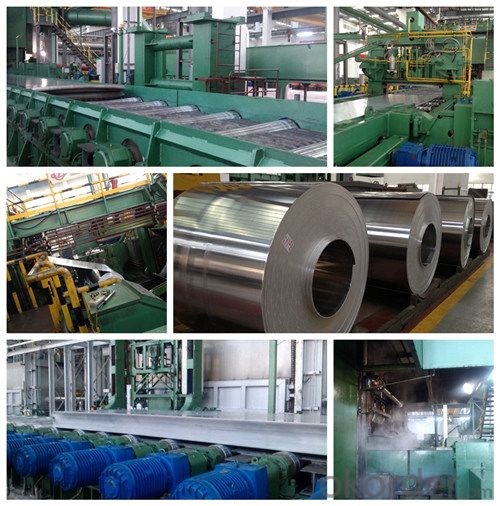
- Q: Are there any limitations on the surface treatment of aluminum coils?
- The surface treatment of aluminum coils has certain limitations. One limitation pertains to the type of surface treatment suitable for aluminum coils. Anodizing, painting, and powder coating are some options for surface finishes. However, not all treatments are suitable for every application. For instance, anodizing is a durable and corrosion-resistant finish but may not meet the requirements of applications that demand specific colors or designs. Similarly, painting and powder coating offer a wide range of colors and aesthetics but may not match the durability of anodizing. Another limitation concerns the size and shape of the aluminum coils. Surface treatment processes have size and shape restrictions for aluminum coils. For example, anodizing is typically performed in tanks or racks, which may have size limitations. Similarly, painting and powder coating processes may require specific equipment or facilities that cannot accommodate large or irregularly shaped coils. Furthermore, the condition of the aluminum surface affects the effectiveness of the surface treatment. Imperfections or surface defects on aluminum coils can impact the adhesion and durability of the treatment. Proper cleaning and preparation of the aluminum surface are crucial to ensure the effectiveness of the surface treatment. In conclusion, while there are various surface treatments available for aluminum coils, limitations exist regarding the type of treatment, the size and shape of the coils, and the condition of the aluminum surface. It is important to consider these limitations and select the most suitable surface treatment based on the specific requirements and constraints of the application.
- Q: Are aluminum coils suitable for chemical processing applications?
- Indeed, aluminum coils prove to be fitting for chemical processing applications. Renowned for its outstanding resistance to corrosion, aluminum emerges as the perfect material for deployment in environments that harbor chemicals. Its ability to withstand numerous acids, alkalis, and solvents guarantees the longevity and sturdiness of the coils. Moreover, aluminum coils boast remarkable heat conductivity, enabling efficient heat transfer throughout the chemical processing procedure. Their lightweight composition further facilitates hassle-free handling and installation. Collectively, aluminum coils emerge as a dependable option for chemical processing applications owing to their corrosion resistance, heat conductivity, and durability.
- Q: What are the different coil uncoiling options for aluminum coils?
- Aluminum coils have a range of coil uncoiling options available to them, catering to specific needs and requirements. One method commonly employed is manual uncoiling, where the coil is carefully unwound by hand. This approach is typically used for smaller coils or situations that demand precision and control. Manual uncoiling enables the delicate handling of the aluminum coil and is frequently favored in smaller scale operations. Another alternative is mechanical uncoiling, which employs machinery or equipment to unwind the coil. Mechanical uncoiling is suitable for larger coils or high-volume production. It facilitates faster and more efficient uncoiling, reducing the labor involved in the process. Moreover, specialized uncoiling machines exist to accommodate specific requirements. For instance, certain machines are designed to handle delicate or sensitive materials and offer features such as adjustable tension control to prevent any damage to the aluminum coil during uncoiling. Additionally, there are custom uncoiling solutions that can be tailored to meet specific needs. These solutions may employ different mechanisms or techniques to ensure the safe and efficient uncoiling of aluminum coils. Ultimately, the choice of coil uncoiling option depends on factors such as coil size, production volume, required precision, and any specific needs or constraints of the application.
- Q: I own a pistol with an aluminum frame. If I were to store it away for a long time, would I need to bother wiping oil over the aluminum surfaces in addition to the steel surfaces? If it helps, there is a dark grey sort of finish on the aluminum.
- no aluminum does not rust anything steel you should probably oil
- Q: Can aluminum coils withstand high temperatures?
- Yes, aluminum coils can withstand high temperatures. Aluminum has a relatively high melting point of approximately 660 degrees Celsius (1220 degrees Fahrenheit). This makes it suitable for applications that involve high-temperature environments. Additionally, aluminum has excellent thermal conductivity, which allows it to dissipate heat efficiently. This property makes aluminum coils commonly used in heat exchangers and various heating applications. However, it is important to note that the specific temperature limit for aluminum coils may vary depending on the specific alloy and application.
- Q: Why does fillet appear when rolling aluminum coil?
- How thick and wide is it when there is such problem? Which is the rolling pass? And what is the type of the rolling mill? The simple 4 rollers or CVC and HC rolling mill with roller control. Does the filler appear in rolling or out of roller? Different thickness will lead to different analysis.
- Q: Can aluminum foil coil be stores for a long time?
- It is ok within one or two years, but for five or six years, it will be oxidized.
- Q: Can aluminum coils be used in the production of electrical transformers?
- The utilization of aluminum coils in the manufacturing of electrical transformers is possible. Aluminum, being a lightweight and cost-effective material, provides numerous advantages in transformer production. Traditionally, copper has been the preferred choice for transformer windings, but aluminum is gaining popularity due to its lower cost and weight. Aluminum coils possess good electrical conductivity and high thermal conductivity, essential for efficient transformer operation. Furthermore, the lighter weight of aluminum coils makes them easier to handle and install. However, it is crucial to acknowledge that aluminum coils necessitate larger cross-sectional areas compared to copper coils to achieve the same electrical conductivity. Additionally, additional measures may be required to counteract the effects of aluminum's higher coefficient of expansion, such as proper insulation and mechanical support. In conclusion, aluminum coils are a viable alternative to copper coils in certain applications, making them suitable for use in electrical transformer production.
- Q: How are aluminum coils used in the manufacturing of signage?
- Aluminum coils are widely used in the manufacturing of signage due to their numerous beneficial properties. These coils are typically made from high-quality aluminum alloy, which offers excellent corrosion resistance and durability, making them ideal for outdoor applications. The first step in using aluminum coils for signage manufacturing is the process of coil slitting. This involves cutting the large aluminum coils into smaller, more manageable sizes that can be easily shaped and formed to meet specific design requirements. This slitting process ensures that the coils are the right width and thickness for the desired signage application. Once the coils are properly sized, they are typically fed into a roll-forming machine. This machine allows for the precise shaping of the aluminum coils into the desired signage profiles, such as flat panels, letters, or channel letters. The flexibility of aluminum allows for intricate and customized designs to be easily achieved. Aluminum offers great versatility in terms of finishing options. The coils can be coated with various protective finishes, such as polyester or PVDF coatings, which provide enhanced durability and resistance to fading, chipping, or peeling. These finishes also allow for a wide range of color choices, enabling signage manufacturers to create eye-catching and vibrant displays. Furthermore, aluminum coils are lightweight, making them easier to handle during the fabrication process and reducing transportation costs. Their lightweight nature also makes them suitable for mounting on various surfaces, such as walls, poles, or freestanding structures. In summary, aluminum coils play a crucial role in the manufacturing of signage by providing a durable, corrosion-resistant, lightweight, and versatile material. They can be easily shaped and formed to create customized designs, and their protective finishes ensure long-lasting and visually appealing signage displays.
- Q: What are the different types of aluminum coils available in the market?
- There are several types of aluminum coils available in the market, including painted aluminum coils, embossed aluminum coils, anodized aluminum coils, and mill finish aluminum coils. Each type has its own unique characteristics and uses, catering to various industries and applications.
Send your message to us
5754 Coated Aluminum Coil - 1050/1100/1070 1060 Aluminum Coil with Good Price and Quality
- Loading Port:
- China main port
- Payment Terms:
- TT or LC
- Min Order Qty:
- 5 m.t.
- Supply Capability:
- 5000 m.t./month
OKorder Service Pledge
OKorder Financial Service
Similar products
Hot products
Hot Searches
Related keywords
